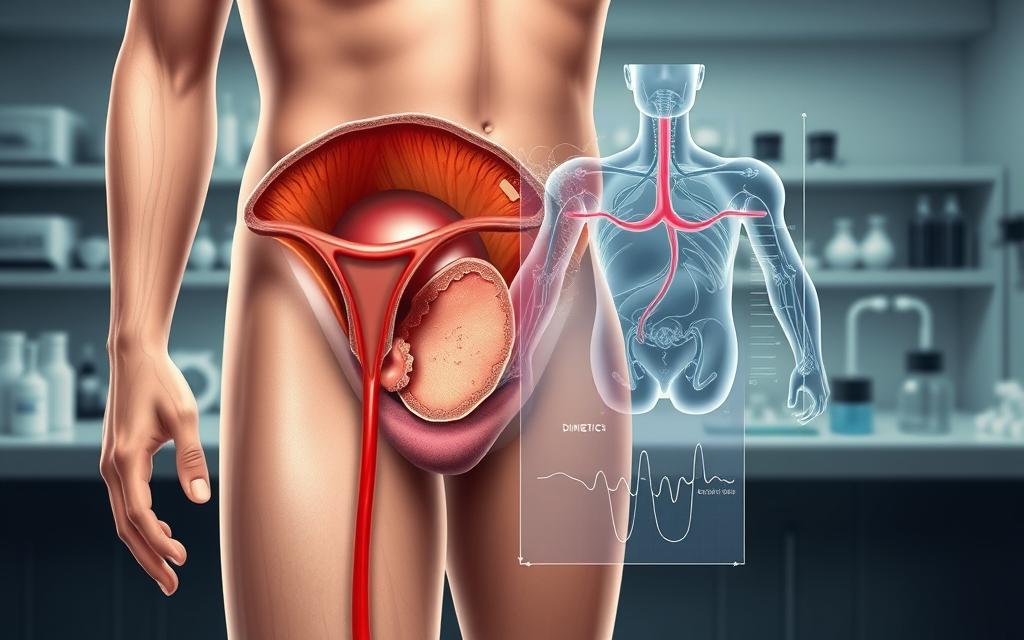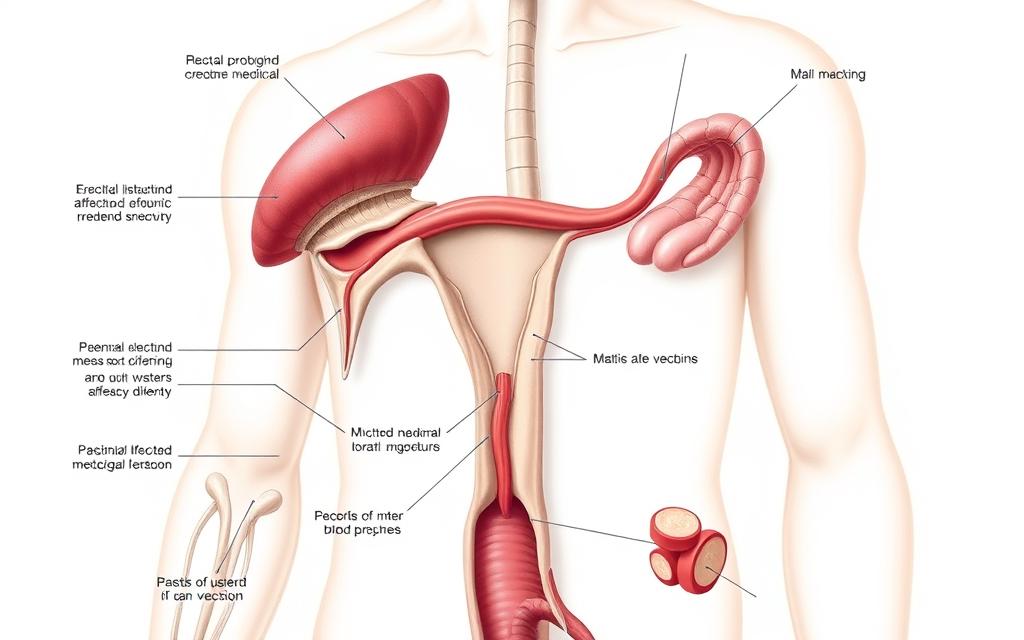How Do Diuretics Cause Erectile Dysfunction? Causes, Effects, and Solutions
Diuretics are commonly prescribed to treat conditions like hypertension and edema. However, their impact on sexual health, particularly concerning erectile dysfunction causes, is a growing concern.
Research suggests that certain diuretics may contribute to the development of erectile issues. Understanding the relationship between diuretics and erectile health is crucial for individuals managing their blood pressure or fluid retention while maintaining their sexual well-being.
The connection between diuretic use and erectile problems is complex, involving various physiological and biochemical factors. Exploring the causes, effects, and potential solutions can provide insights into managing this side effect.
By delving into the specifics of how diuretics influence erectile function, individuals can better navigate their treatment options and make informed decisions about their health.
Understanding Diuretics and Their Function
Diuretics are a class of medications that play a crucial role in managing various health conditions, particularly those related to fluid balance in the body. To understand how diuretics can impact erectile function, it’s essential to first grasp what diuretics are and how they work.
Diuretics are commonly prescribed to treat conditions such as hypertension (high blood pressure) and edema (swelling caused by excess fluid). They work by increasing urine production, which helps reduce fluid buildup in the body.
Types of Diuretics Commonly Prescribed
There are several types of diuretics, each with its own mechanism of action and specific uses. The main types include thiazide diuretics, loop diuretics, and potassium-sparing diuretics.
Thiazide Diuretics
Thiazide diuretics are often used to treat hypertension. They work by reducing the amount of sodium reabsorbed by the kidneys, leading to increased urine production.
Loop Diuretics
Loop diuretics are more potent than thiazides and are used to treat edema and more severe cases of hypertension. They act on the Loop of Henle in the kidneys to increase urine output.
Potassium-Sparing Diuretics
Potassium-sparing diuretics help the body retain potassium while still removing excess fluid. They are often used in combination with other diuretics to mitigate potassium loss.
Medical Conditions Treated with Diuretics
Diuretics are used to treat a variety of medical conditions, including:
- Hypertension
- Edema
- Heart failure
- Liver cirrhosis
By managing these conditions, diuretics can significantly improve the quality of life for many patients.
How Diuretics Work in the Body
Diuretics work by affecting the kidneys’ ability to reabsorb sodium and water. This leads to increased urine production, reducing fluid volume in the body and subsequently lowering blood pressure.
| Type of Diuretic | Mechanism of Action | Common Uses |
|---|---|---|
| Thiazide Diuretics | Reduce sodium reabsorption | Hypertension |
| Loop Diuretics | Act on the Loop of Henle to increase urine output | Edema, severe hypertension |
| Potassium-Sparing Diuretics | Help retain potassium while removing excess fluid | Used in combination with other diuretics |

Understanding the different types of diuretics and their functions is crucial for comprehending their potential impact on erectile function. By managing fluid balance and blood pressure, diuretics play a vital role in treating various health conditions.
The Connection Between Diuretics and Erectile Dysfunction
Understanding the connection between diuretics and erectile dysfunction requires a closer look at physiological changes. Diuretics are widely used to treat conditions like hypertension and heart failure, but their impact on erectile function is a significant concern for many patients.
Physiological Mechanisms Behind Diuretic-Induced ED
The physiological mechanisms behind diuretic-induced erectile dysfunction are multifaceted. Two key factors are blood pressure changes and hormonal influences.
Blood Pressure Changes and Erectile Function
Diuretics work by reducing fluid volume in the body, which can lower blood pressure. However, significant changes in blood pressure can affect blood flow to the penis, potentially leading to erectile dysfunction. It’s essential to monitor blood pressure regularly when using diuretics.
Hormonal Influences
Hormonal changes can also play a role in diuretic-induced ED. Some diuretics may influence hormone levels, including testosterone, which is crucial for erectile function. Alterations in hormonal balance can contribute to the development of ED.

Risk Factors That Increase Susceptibility
Certain individuals are more susceptible to diuretic-induced ED due to various risk factors. Understanding these factors can help in managing the condition.
Age-Related Considerations
Age is a significant risk factor for erectile dysfunction. Older adults may be more prone to the adverse effects of diuretics on erectile function due to decreased vascular health and other age-related changes.
Pre-existing Conditions
Pre-existing health conditions, such as diabetes and cardiovascular disease, can increase the risk of developing ED while taking diuretics. Managing these conditions effectively is crucial.
Timeline and Progression of Symptoms
The timeline for developing diuretic-induced ED can vary. Some individuals may experience symptoms shortly after starting diuretic therapy, while others may not notice any issues until later. Monitoring erectile function and reporting any changes to a healthcare provider is essential.
Dysfunction Erectile Images: Visual Understanding of the Impact
The visual impact of diuretics on erectile function is a critical aspect of understanding how these medications can lead to erectile dysfunction (ED). To comprehend this relationship, it’s essential to delve into the physiological changes caused by diuretics.
How Diuretics Affect Blood Flow in Erectile Tissue
Diuretics alter the body’s fluid balance, which can have a cascading effect on various physiological processes, including blood flow to erectile tissue. Reduced blood flow is a critical factor in the development of ED.
Vascular Changes Visualized
When diuretics are used, the vascular system undergoes changes that can be visualized through medical imaging. These changes often include reduced vascular dilation and increased vascular resistance, both of which can impede normal erectile function.
Erectile tissue responds to reduced blood flow by undergoing changes that can lead to dysfunction. This includes potential damage to the endothelial cells lining the blood vessels, further exacerbating ED.
Comparing Normal Function vs. Diuretic-Affected Function
Understanding the difference between normal erectile function and diuretic-affected function is crucial. Normally, erectile tissue receives adequate blood flow, allowing for proper erection. In contrast, diuretic-affected erectile tissue suffers from impaired blood flow, leading to difficulties in achieving or maintaining an erection.
- Normal erectile function is characterized by healthy blood flow and vascular responsiveness.
- Diuretic-affected erectile function is marked by reduced blood flow and impaired vascular health.
Psychological Impact of Diuretic-Induced ED
The psychological impact of experiencing ED due to diuretic use can be significant. Individuals may suffer from body image concerns and relationship strain due to the changes in their sexual function.
Body Image Concerns
Men experiencing diuretic-induced ED may develop negative perceptions of their body image, feeling less masculine or capable. This can lead to decreased self-esteem and confidence.
Relationship Effects
The strain on personal relationships can be substantial. Partners may feel concerned or frustrated by the changes in sexual function, potentially leading to relationship conflicts if not addressed openly.
By understanding the visual and physiological impacts of diuretics on erectile function, individuals can better navigate the challenges posed by diuretic-induced ED.
Solutions and Treatment Options for Diuretic-Induced ED
Diuretic-induced erectile dysfunction can be effectively managed through a combination of medication changes, lifestyle modifications, and targeted medical treatments. Understanding the available options is crucial for individuals seeking to alleviate symptoms and improve their quality of life.
Medication Adjustments and Alternatives
One of the primary approaches to addressing diuretic-induced ED is to adjust the medication regimen. This can involve discussing alternative treatments with a healthcare provider.
Discussing Changes with Your Doctor
It is essential to consult with a doctor before making any changes to your medication. They can help determine the best course of action and recommend alternative treatments that may have fewer side effects on erectile function.
Open communication with your healthcare provider is key to finding the right balance between managing hypertension and minimizing the risk of ED.
Alternative Blood Pressure Medications
There are several blood pressure medications that may have a lower risk of causing ED. These include ACE inhibitors and calcium channel blockers, which are sometimes considered as alternatives to diuretics.
- ACE inhibitors: Known for their protective effects on the cardiovascular system.
- Calcium channel blockers: Can help relax blood vessels, improving blood flow.
Lifestyle Modifications to Reduce ED Symptoms
In addition to medication adjustments, adopting certain lifestyle changes can significantly reduce the symptoms of ED.
Dietary Considerations
A healthy diet rich in fruits, vegetables, and whole grains can improve overall cardiovascular health, potentially reducing the risk of ED.
Limiting alcohol consumption and avoiding excessive salt intake are also recommended.
Exercise and Weight Management
Regular physical activity and maintaining a healthy weight can enhance blood flow and overall cardiovascular health, which may help alleviate ED symptoms.
Exercise routines that include aerobic activities, such as walking or cycling, can be particularly beneficial.
Medical Interventions for Erectile Dysfunction
For some individuals, medical interventions may be necessary to effectively manage ED.
ED Medications
Several medications are available that can help treat ED, including PDE5 inhibitors like sildenafil and tadalafil.
- PDE5 inhibitors: Work by increasing blood flow to the penis.
- Other treatments: May include vacuum erection devices or penile implants in more severe cases.
Other Treatment Options
In addition to medication, other treatments can help manage ED, such as counseling or therapy to address any underlying psychological factors.
A comprehensive approach that combines medical treatment with lifestyle changes can offer the best outcomes for individuals with diuretic-induced ED.
Conclusion
Understanding the relationship between diuretics and erectile dysfunction is crucial for individuals managing hypertension and other cardiovascular conditions. The main points discussed in this article highlight the physiological mechanisms behind diuretic-induced erectile dysfunction, risk factors that increase susceptibility, and available treatment options.
Diuretics, while effective in treating various medical conditions, can impact blood flow to erectile tissue, leading to erectile dysfunction. Adjusting medications, adopting lifestyle modifications, and exploring medical interventions can help alleviate symptoms. By being aware of these factors, individuals can take an active role in managing their health and mitigating potential side effects.
A summary of the main points reveals that a comprehensive approach is necessary to address diuretic-induced erectile dysfunction. This includes understanding the types of diuretics, their effects on the body, and the available solutions. By doing so, individuals can make informed decisions about their health and well-being.
